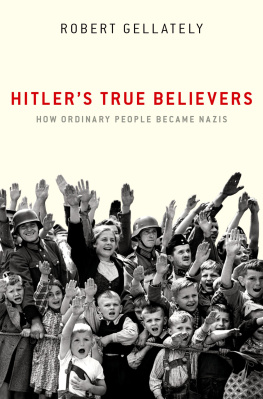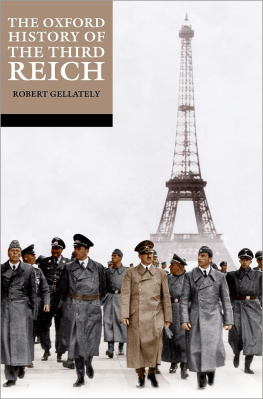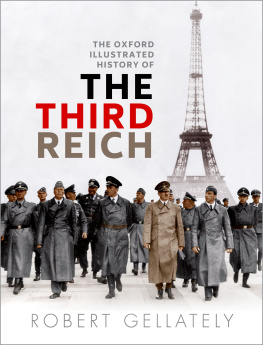Robert Gellately - Hitlers True Believers: How Ordinary People Became Nazis
Here you can read online Robert Gellately - Hitlers True Believers: How Ordinary People Became Nazis full text of the book (entire story) in english for free. Download pdf and epub, get meaning, cover and reviews about this ebook. year: 2020, publisher: Oxford University Press, genre: Politics. Description of the work, (preface) as well as reviews are available. Best literature library LitArk.com created for fans of good reading and offers a wide selection of genres:
Romance novel
Science fiction
Adventure
Detective
Science
History
Home and family
Prose
Art
Politics
Computer
Non-fiction
Religion
Business
Children
Humor
Choose a favorite category and find really read worthwhile books. Enjoy immersion in the world of imagination, feel the emotions of the characters or learn something new for yourself, make an fascinating discovery.
- Book:Hitlers True Believers: How Ordinary People Became Nazis
- Author:
- Publisher:Oxford University Press
- Genre:
- Year:2020
- Rating:4 / 5
- Favourites:Add to favourites
- Your mark:
- 80
- 1
- 2
- 3
- 4
- 5
Hitlers True Believers: How Ordinary People Became Nazis: summary, description and annotation
We offer to read an annotation, description, summary or preface (depends on what the author of the book "Hitlers True Believers: How Ordinary People Became Nazis" wrote himself). If you haven't found the necessary information about the book — write in the comments, we will try to find it.
Hitlers True Believers: How Ordinary People Became Nazis — read online for free the complete book (whole text) full work
Below is the text of the book, divided by pages. System saving the place of the last page read, allows you to conveniently read the book "Hitlers True Believers: How Ordinary People Became Nazis" online for free, without having to search again every time where you left off. Put a bookmark, and you can go to the page where you finished reading at any time.
Font size:
Interval:
Bookmark:


Also by Robert Gellately:
The Oxford Illustrated History of the Third Reich (edited by Robert Gellately)
Backing Hitler: Consent and Coercion in Nazi Germany, 1933-1945
Stalins Curse: Battling for Communism in War and Cold War
Lenin, Stalin and Hitler: The Age of Social Catastrophe
The Gestapo and German Society: Enforcing Racial Policy, 1933-1945
The Nuremberg Interviews: An American Psychiatrists Conversations with the Defendants and Witnesses at the Nuremberg Trials (edited by Robert Gellately)
The Specter of Genocide: Mass Murder and Other Mass Crimes in Historical Perspective (edited with Ben Kiernan)
Social Outsiders in Nazi Germany (edited with Nathan Stoltzfus)
Accusatory Practices: Denunciation in Modern European History, 1789-1989 (edited with Sheila Fitzpatrick)
The Politics of Economic Despair: Shopkeepers and German Politics, 1890-1914

Oxford University Press is a department of the University of Oxford. It furthers the Universitys objective of excellence in research, scholarship, and education by publishing worldwide. Oxford is a registered trade mark of Oxford University Press in the UK and certain other countries.
Published in the United States of America by Oxford University Press
198 Madison Avenue, New York, NY 10016, United States of America.
Robert Gellately 2020
All rights reserved. No part of this publication may be reproduced, stored in a retrieval system, or transmitted, in any form or by any means, without the prior permission in writing of Oxford University Press, or as expressly permitted by law, by license, or under terms agreed with the appropriate reproduction rights organization. Inquiries concerning reproduction outside the scope of the above should be sent to the Rights Department, Oxford University Press, at the address above.
You must not circulate this work in any other form and you must impose this same condition on any acquirer.
CIP data is on file at the Library of Congress
ISBN 9780190689902
eISBN 9780190689926
For Marie and Diana

What paths did true believers take to Nazism? Why did they join what was initially a small, extremist, and often violent movement on the fringes of German politics? When the party began its election campaigning, why did people increasingly vote for it during the years of the Great Depression from 1929 onward and make it the largest in the country? Even then, many millions withheld their support, as they would, if covertly, in the Third Reich. Were the recruits simply converted by hearing a spellbinding Hitler speech? Or did they find their own way to National Socialism? How was this all-embracing theory applied in the Third Reich after 1933 and into the catastrophic war years? To what extent did people internalize or consume the doctrine of National Socialism, or reject it?
In the first half of the book I examine how ordinary people became Nazis, or at least supported the party and voted for it in elections down to 1933. We need to remember that Hitler squeaked into power with the help of those in positions of power who wanted to get rid of democracy forever. Into the Third Reich I trace how the regime applied its teachings to major domestic and foreign political events, racial persecution, and cultural developments, including in art and architecture, and how people reacted or behaved in that context.
This story begins with a focus on Hitler. Like millions of others after Germanys lost war, he was psychologically adrift, searching for answers and some kind of political salvation. How did he find the tiny fringe group, the German Workers Party (DAP), that he and a few others transformed in 1920 into the imposing-sounding National Socialist German Workers Party (NSDAP), or Nazi Party?
Insofar as Hitler had fixed ideas at the end of the Great War in 1918, high on the list was nationalism, in spite of the aspersions cast against it by mutinous sailors and rebellious soldiers tired of the fighting. Some aspects of what became his doctrine or ideology stemmed from the cluster of ideas, resentments, and passions widely shared in Germany at that time. His views and those of his comrades also reflected the fact that Germany was already a nation with a great deal of egalitarianism baked into its political culture. Almost without exception, the Nazis emphasized all kinds of socialist attitudes, to be sure a socialism cleansed of international Marxism and communism. Indeed, when he looked back from 1941, Hitler said of the NSDAP in the 1920s that 90 ninety percent of it was made up by left-wing people.
A sense of the persistent appeals of both nationalism and socialism after 1918 was that many of the new or renamed political parties in the Weimar Republic, including the German Catholic Center Party, either possessed or adopted some form of socialist, nationalist, or racialist signifier in their new or modified names. Even the stodgy old conservatives had to change themselves into the cumbersome German National Peoples Party (DNVP). The political Left in 1918 and 1919 soon fractured into the moderate Social Democratic Party of Germany (SPD) and a breakaway from it in the Communist Party of Germany (KPD). It is worth noting the obvious, that both felt they still needed Germany in their titles, if only as a continuing nod to nationalism. The (renamed) liberals and conservatives went their own way.
That Germany on the eve of Hitlers appointment as chancellor in January 1933 continued to have a socialist-oriented political culture can be illustrated by pointing to the last free elections of the Weimar Republic the previous November. No less than 71.6 percent of the vote went to parties with socialist or communist in their titles. It is true that these parties were bitter enemies, though they still shared widespread socialist attitudes and expectations. On top of that, a hypothetical survey of German public opinion at the same time likely would have shown that the overwhelming majoritycutting across all party lineswould have resolutely rejected the humiliating Versailles Treaty of 1919 that blamed Germany for the Great War, forced it to pay reparations, limited its armed forces, and reduced its territory. No genius leader was needed to figure out that combining nationalism, socialism, and a hefty dose of militarism might produce a socially dynamic movement that could mobilize the entire nation.
When Hitler returned to Munich in late 1918 it would have been impossible for him to overlook the antisemitism that was endemic in the city and much of the country, as it had been since well before the Great War. To some extent, he must have been steeped in an atmosphere hostile to Jews during his prewar years in Vienna. However, there is no reliable evidence that he had given expression to any race hatred before 1919, and in fact he had gotten along quite well with the Jews in his immediate environment. He remembered that, when his mother was suffering a lingering, painful death, Dr. Eduard Bloch, a Jew, did his best to help, and decades later Hitler saw to it that the doctor obtained safe passage out of the country. It was all the more appalling that from 1919 Hitler made radical and rational (as opposed to merely emotional) antisemitism a foundational part of his political philosophy.
Font size:
Interval:
Bookmark:
Similar books «Hitlers True Believers: How Ordinary People Became Nazis»
Look at similar books to Hitlers True Believers: How Ordinary People Became Nazis. We have selected literature similar in name and meaning in the hope of providing readers with more options to find new, interesting, not yet read works.
Discussion, reviews of the book Hitlers True Believers: How Ordinary People Became Nazis and just readers' own opinions. Leave your comments, write what you think about the work, its meaning or the main characters. Specify what exactly you liked and what you didn't like, and why you think so.










